
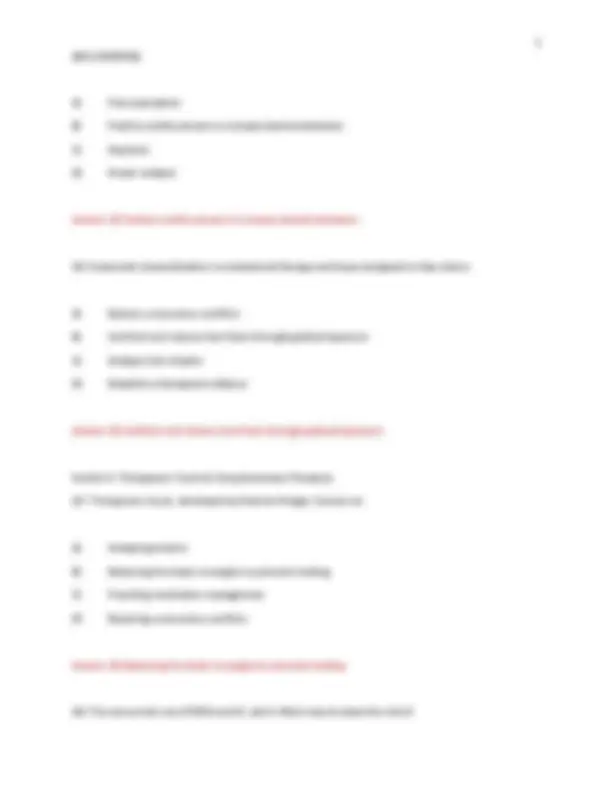
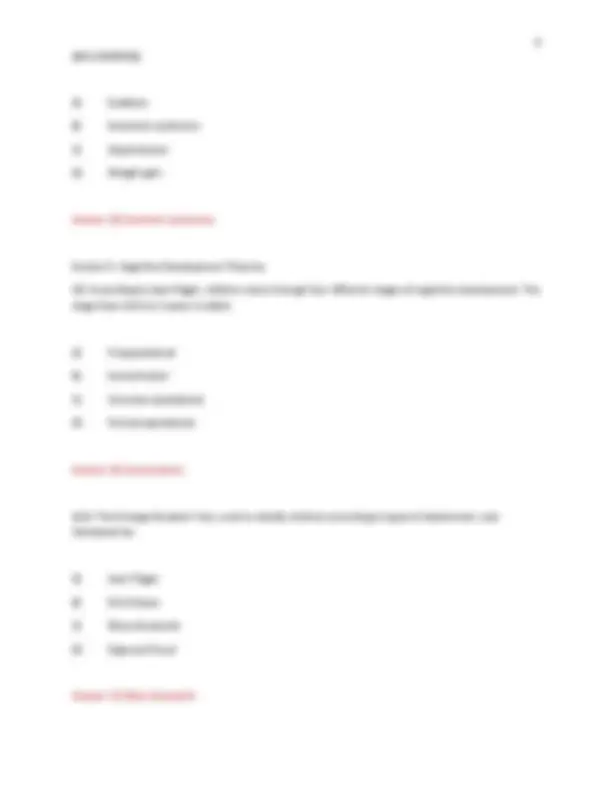
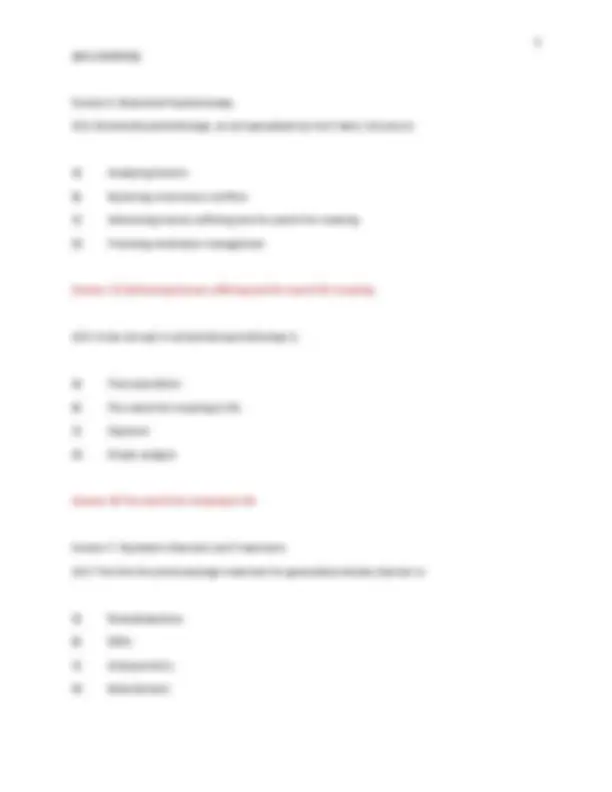
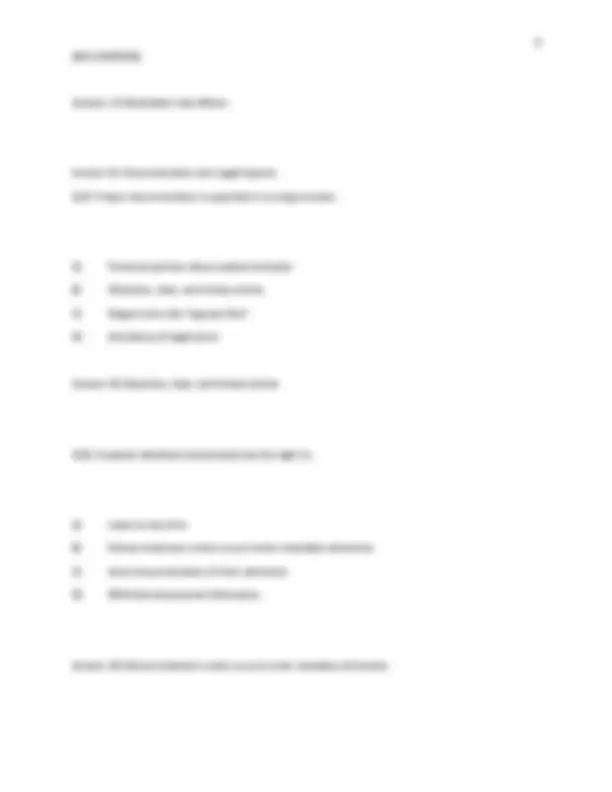
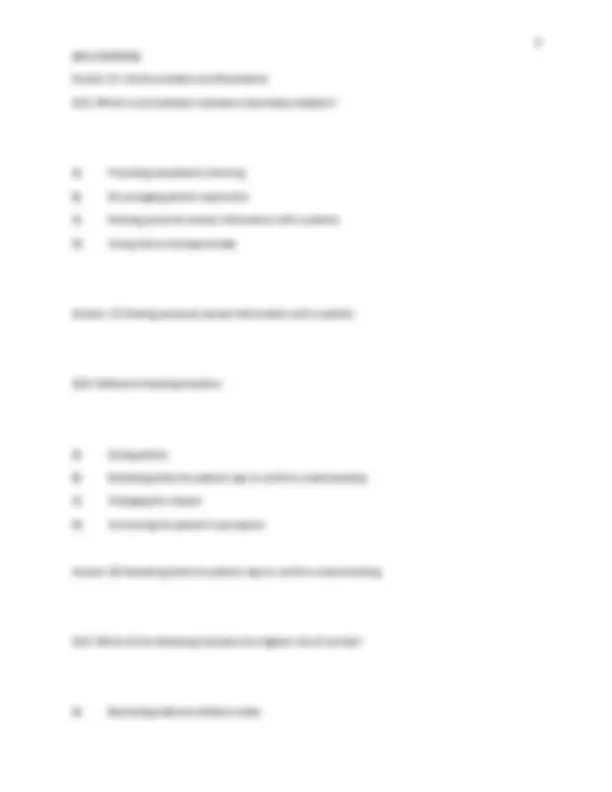
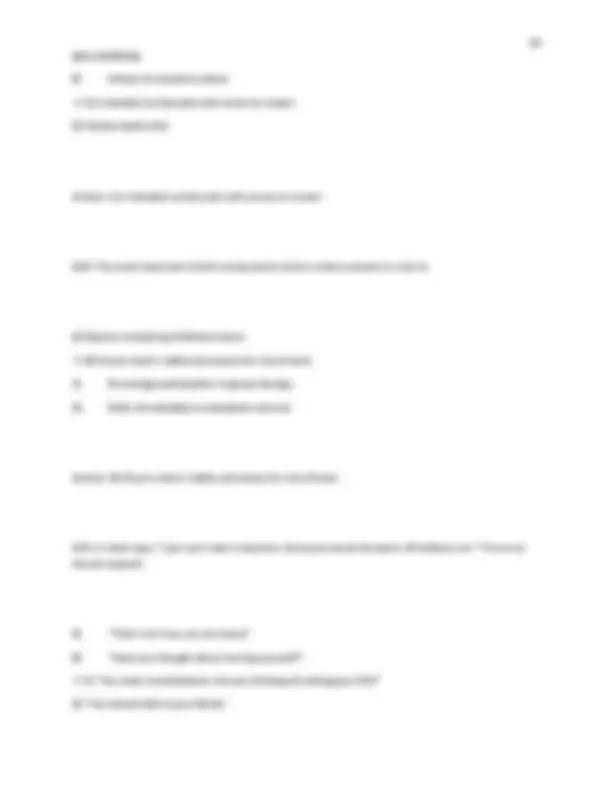
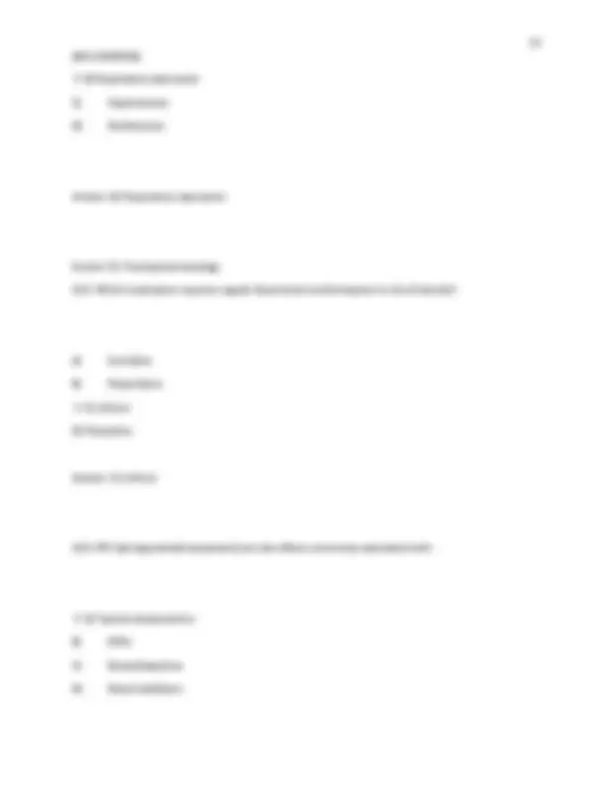
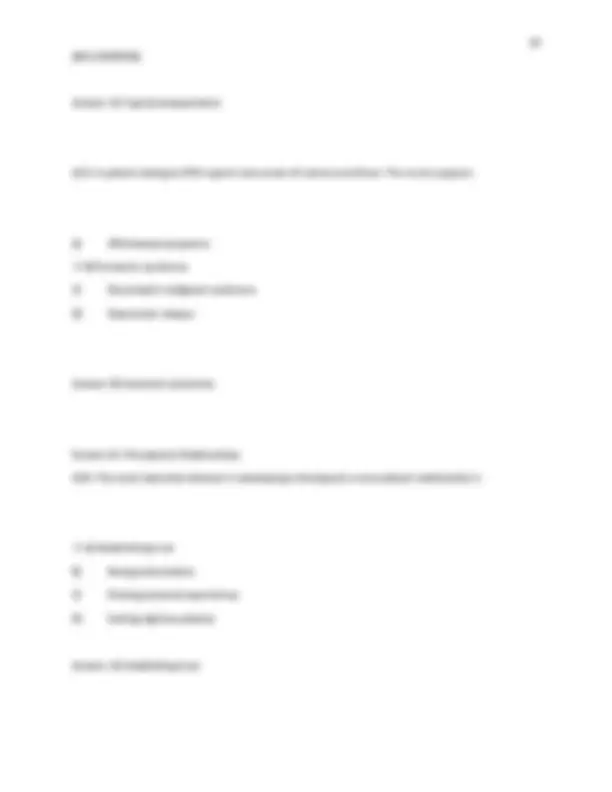
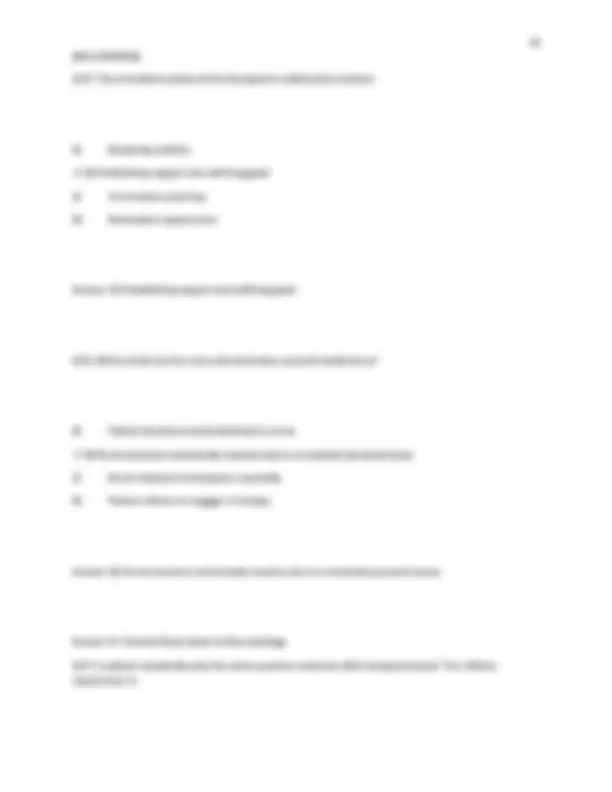
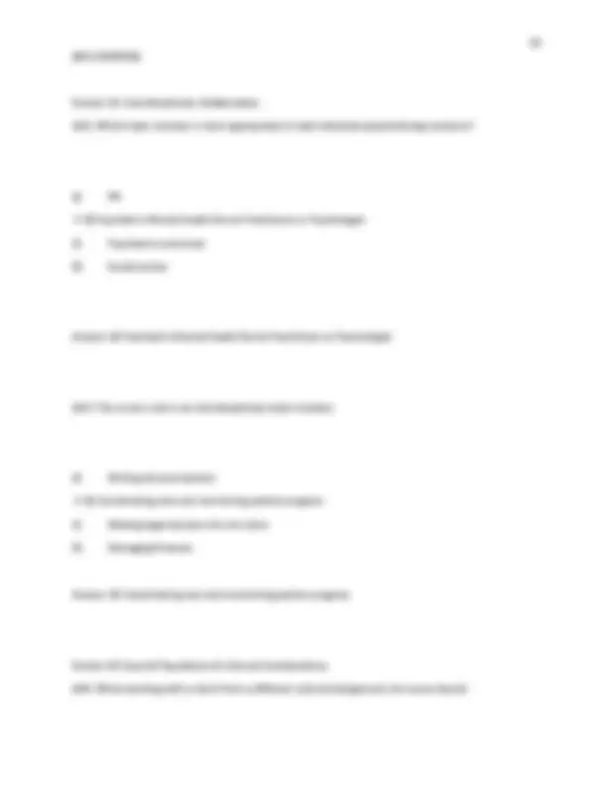
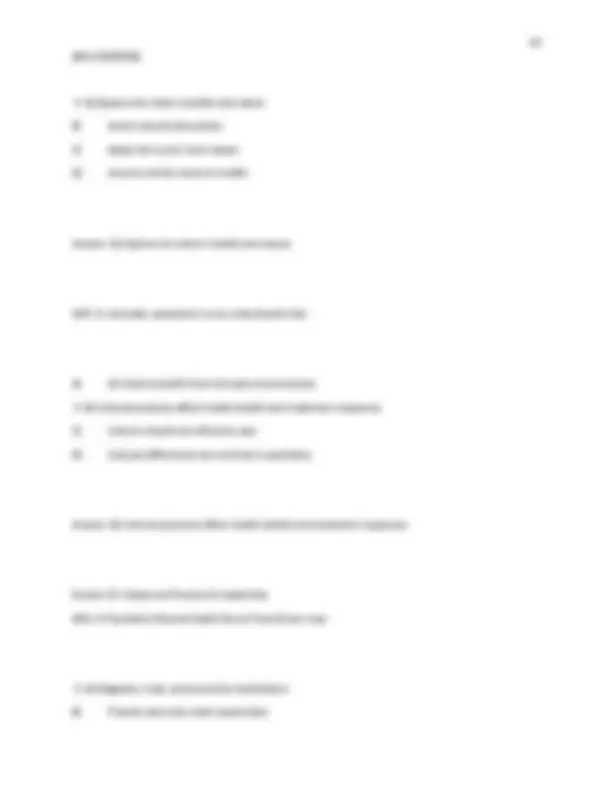
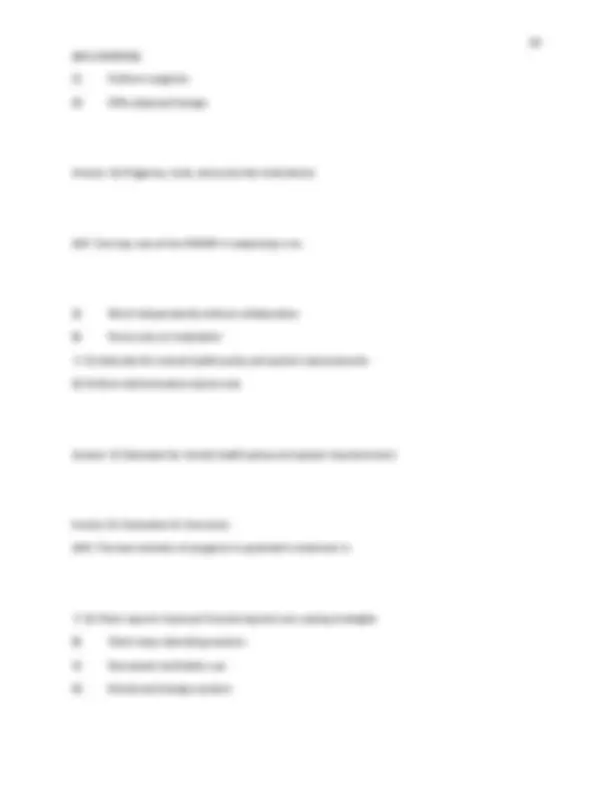
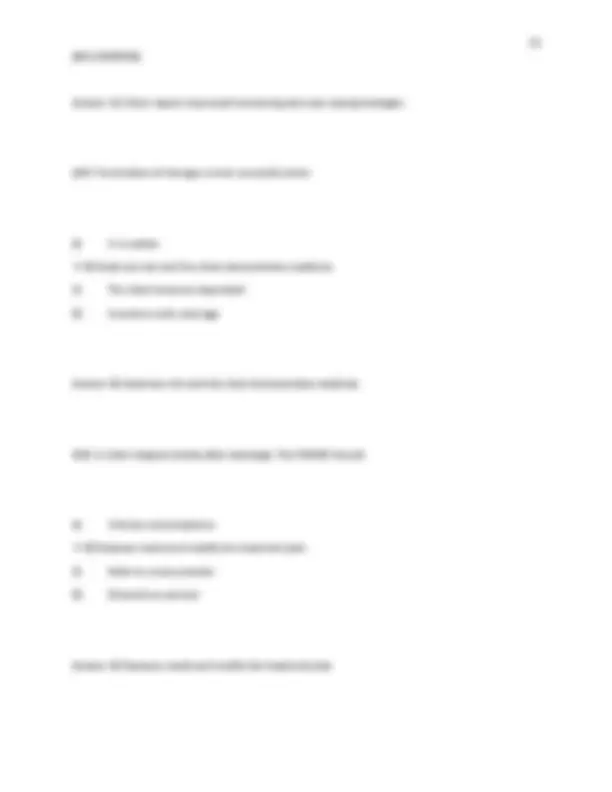
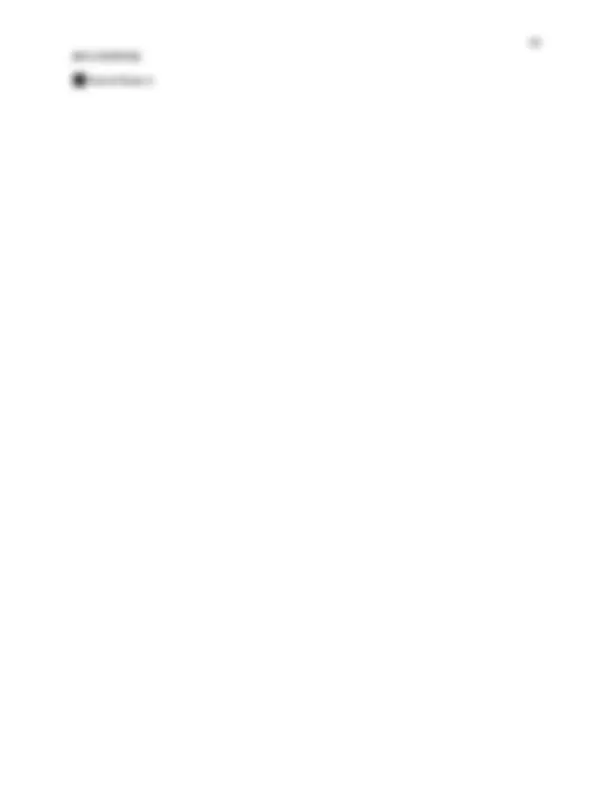


Study with the several resources on Docsity

Earn points by helping other students or get them with a premium plan


Prepare for your exams
Study with the several resources on Docsity

Earn points to download
Earn points by helping other students or get them with a premium plan
Community
Ask the community for help and clear up your study doubts
Discover the best universities in your country according to Docsity users
Free resources
Download our free guides on studying techniques, anxiety management strategies, and thesis advice from Docsity tutors
A series of multiple-choice questions and answers related to clinical modalities and advanced psychology, specifically tailored for an nsg 526 exam at wilkes university. The questions cover a range of topics including cognitive-behavioral therapy (cbt), dialectical behavior therapy (dbt), group therapy dynamics, behavioral therapies, therapeutic touch, complementary therapies, cognitive development theories, existential psychotherapy, psychiatric disorders and treatments, child & adolescent psychiatry, geriatric psychiatry, documentation and legal aspects, communication and boundaries, trauma and stressor-related disorders, substance use disorders, psychopharmacology, and therapeutic relationships. Each question is followed by the correct answer, making it a useful resource for exam preparation and review of key concepts in advanced psychology and clinical practice.
Typology: Exams
1 / 22

This page cannot be seen from the preview
Don't miss anything!















Instructions: Duration: 90 minutes Format: Multiple Choice Total Questions: 50 Passing Score: 80% or higher Section 1: Cognitive-Behavioral Therapy (CBT) & Dialectical Behavior Therapy (DBT) Q1: In CBT, the primary goal is to: A) Explore unconscious conflicts B) Change maladaptive thought patterns to influence behavior C) Provide insight into past trauma D) Establish a therapeutic alliance Answer: B) Change maladaptive thought patterns to influence behavior Q2: Which of the following is a core component of DBT? A) Free association B) Mindfulness and emotional regulation
C) Hypnosis D) Dream analysis Answer: B) Mindfulness and emotional regulation Section 2: Group Therapy Dynamics Q3: The primary purpose of group therapy is to: A) Provide individual therapy in a group setting B) Facilitate changes by the patient to address identified problems C) Diagnose psychiatric disorders D) Replace individual therapy Answer: B) Facilitate changes by the patient to address identified problems Q4: A technique for dealing with an over-talkative client and silence from other participants in a group during therapy is to: A) Ignore the behavior B) Make an observation about the group's silence and invite others to comment C) Confront the over-talkative client D) End the session early Answer: B) Make an observation about the group's silence and invite others to comment Section 3: Behavioral Therapies Q5: Operant conditioning is the basis for behavior modification and uses:
A) Sedation B) Serotonin syndrome C) Hypertension D) Weight gain Answer: B) Serotonin syndrome Section 5: Cognitive Development Theories Q9: According to Jean Piaget, children move through four different stages of cognitive development. The stage from birth to 2 years is called: A) Preoperational B) Sensorimotor C) Concrete operational D) Formal operational Answer: B) Sensorimotor Q10: The Strange Situation Test, used to classify children according to types of attachment, was developed by: A) Jean Piaget B) Erik Erikson C) Mary Ainsworth D) Sigmund Freud Answer: C) Mary Ainsworth
Section 6: Existential Psychotherapy Q11: Existential psychotherapy, as conceptualized by Irvin Yalom, focuses on A) Analyzing dreams B) Exploring unconscious conflicts C) Addressing human suffering and the search for meaning D) Providing medication management Answer: C) Addressing human suffering and the search for meaning Q12: A key concept in existential psychotherapy is: A) Free association B) The search for meaning in life C) Hypnosis D) Dream analysis Answer: B) The search for meaning in life Section 7: Psychiatric Disorders and Treatments Q13: The first-line pharmacologic treatment for generalized anxiety disorder is: A) Benzodiazepines B) SSRIs C) Antipsychotics D) Beta-blockers
C) Lithium D) Risperidone Answer: A) Methylphenidate Section 9: Geriatric Psychiatry Q17: A key distinguishing feature of delirium is: A) Slow onset of memory loss B) Acute onset and fluctuating consciousness C) Gradual decline in cognition D) Irreversibility Answer: B) Acute onset and fluctuating consciousness Q18: The most common cause of reversible confusion in elderly patients is: A) Dementia B) Parkinson’s disease C) Medication side effects D) Alzheimer’s disease
Answer: C) Medication side effects Section 10: Documentation and Legal Aspects Q19: Proper documentation in psychiatric nursing includes: A) Personal opinions about patient behavior B) Objective, clear, and timely entries C) Vague terms like "appears fine" D) Avoidance of legal terms Answer: B) Objective, clear, and timely entries Q20: A patient admitted involuntarily has the right to: A) Leave at any time B) Refuse treatment unless a court order mandates otherwise C) Avoid documentation of their admission D) Withhold all personal information Answer: B) Refuse treatment unless a court order mandates otherwise
B) History of substance abuse → C) A detailed suicide plan with access to means D) Passive death wish Answer: C) A detailed suicide plan with access to means Q24: The most important initial nursing action when a client presents in crisis is: A) Explore underlying childhood issues → B) Ensure client’s safety and assess for risk of harm C) Encourage participation in group therapy D) Refer immediately to outpatient services Answer: B) Ensure client’s safety and assess for risk of harm Q25: A client says, “I just can’t take it anymore. Everyone would be better off without me.” The nurse should respond: A) “That’s not true, you are loved.” B) “Have you thought about hurting yourself?” → C) “You seem overwhelmed. Are you thinking of ending your life?” D) “You should talk to your family.”
Answer: C) “You seem overwhelmed. Are you thinking of ending your life?” Section 13: Trauma and Stressor-Related Disorders Q26: Which symptom is most characteristic of PTSD? A) Social withdrawal → B) Flashbacks and hypervigilance C) Elevated mood D) Emotional detachment only Answer: B) Flashbacks and hypervigilance Q27: A nurse working with a trauma survivor should prioritize: A) Exploring childhood trauma in detail B) Avoiding mention of trauma → C) Establishing safety and trust D) Encouraging immediate trauma narrative Answer: C) Establishing safety and trust
→ B) Respiratory depression C) Hypertension D) Restlessness Answer: B) Respiratory depression Section 15: Psychopharmacology Q31: Which medication requires regular blood level monitoring due to risk of toxicity? A) Sertraline B) Risperidone → C) Lithium D) Fluoxetine Answer: C) Lithium Q32: EPS (extrapyramidal symptoms) are side effects commonly associated with: → A) Typical antipsychotics B) SSRIs C) Benzodiazepines D) Mood stabilizers
Answer: A) Typical antipsychotics Q33: A patient taking an SSRI reports new onset of tremors and fever. The nurse suspects: A) Withdrawal symptoms → B) Serotonin syndrome C) Neuroleptic malignant syndrome D) Depression relapse Answer: B) Serotonin syndrome Section 16: Therapeutic Relationships Q34: The most important element in developing a therapeutic nurse-patient relationship is: → A) Establishing trust B) Being authoritative C) Sharing personal experiences D) Setting rigid boundaries Answer: A) Establishing trust
A) Judgment B) Thought content → C) Recent memory D) Mood Answer: C) Recent memory Q38: Flight of ideas is commonly associated with: → A) Mania B) Depression C) Schizophrenia D) PTSD Answer: A) Mania Q39: A patient is experiencing command hallucinations. The nurse should: A) Encourage discussion of hallucinations without concern → B) Assess content and ensure safety C) Ignore the hallucination to avoid reinforcement D) Provide PRN pain medication
Answer: B) Assess content and ensure safety Section 18: Ethics & Legal Considerations Q40: A client refuses medication. The nurse should first: A) Document noncompliance → B) Assess the client’s decision-making capacity C) Ask the physician to override refusal D) Administer the medication covertly Answer: B) Assess the client’s decision-making capacity Q41: A court-ordered client refuses all treatment. The nurse should: → A) Follow the court’s mandate while ensuring ethical practice B) Release the client C) Force medication without consent D) Ignore the refusal Answer: A) Follow the court’s mandate while ensuring ethical practice
→ A) Explore the client’s beliefs and values B) Avoid cultural discussions C) Apply the nurse’s own values D) Assume similar views on health Answer: A) Explore the client’s beliefs and values Q45: A culturally competent nurse understands that: A) All clients benefit from the same interventions → B) Cultural practices affect health beliefs and treatment responses C) Culture should not influence care D) Cultural differences are minimal in psychiatry Answer: B) Cultural practices affect health beliefs and treatment responses Section 21: Advanced Practice & Leadership Q46: A Psychiatric Mental Health Nurse Practitioner may: → A) Diagnose, treat, and prescribe medications B) Provide care only under supervision
C) Perform surgeries D) Offer physical therapy Answer: A) Diagnose, treat, and prescribe medications Q47: One key role of the PMHNP in leadership is to: A) Work independently without collaboration B) Focus only on medication → C) Advocate for mental health policy and system improvements D) Perform administrative duties only Answer: C) Advocate for mental health policy and system improvements Section 22: Evaluation & Outcomes Q48: The best indicator of progress in psychiatric treatment is: → A) Client reports improved functioning and uses coping strategies B) Client stops attending sessions C) Decreased medication use D) Shortened therapy sessions